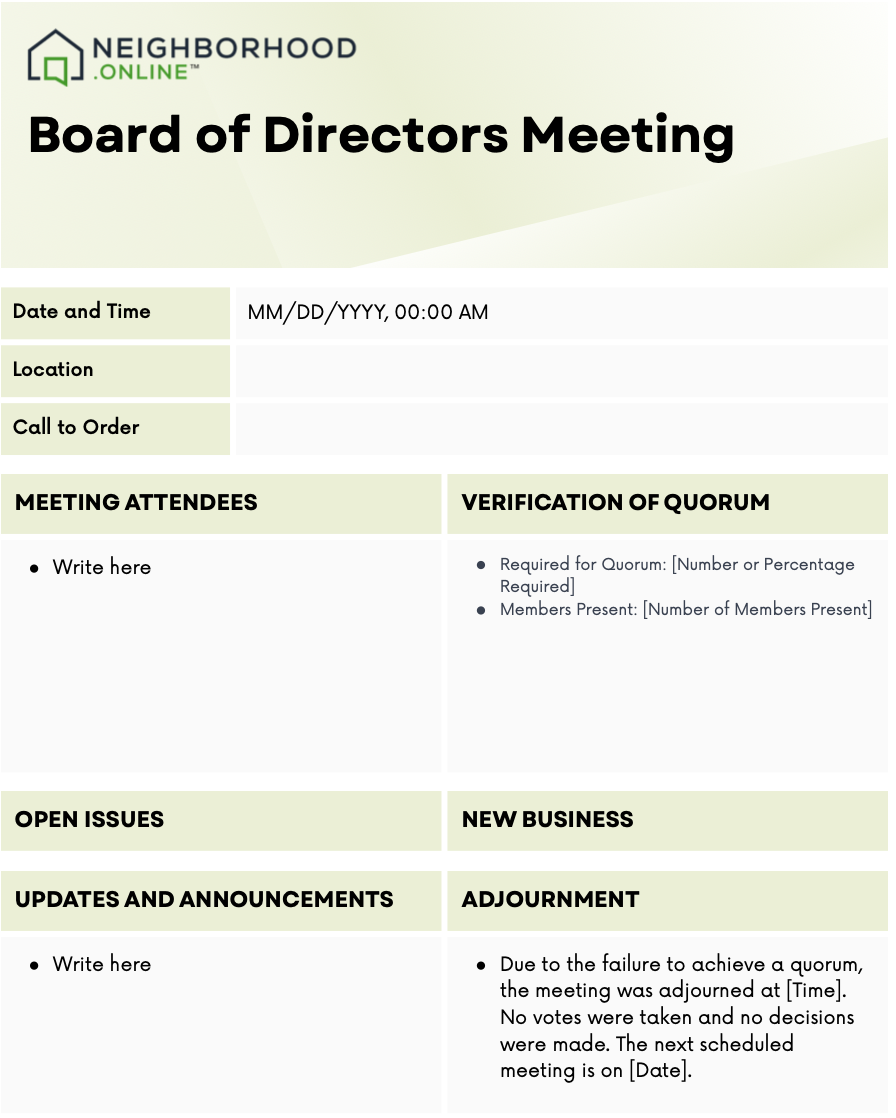Meeting Quorum
Navigating the world of Homeowners' Associations (HOAs) can often feel like a complex puzzle, filled with rules, bylaws, and the occasional legislative curveball. One such complexity is the concept of a quorum—a term that, if not fully understood and achieved, can create various obstacles for an HOA's governance. But what exactly happens when an HOA fails to reach its required quorum? The repercussions can be multifaceted, affecting not just the HOA board but also the community it represents. In this blog post, we'll walk you through what a quorum is, the complications that arise when it isn't met, and potential legislative solutions that could ease this perennial problem
What is a Quorum?
Before diving into the consequences of not reaching a quorum, it's essential to understand what "quorum" actually means. In the context of a Homeowners' Association (HOA), a quorum is the minimum number of members who must be present at a meeting for the proceedings to be legally valid. This number is typically specified in the HOA's bylaws and may be expressed as a percentage of the total membership or a fixed number. Reaching a quorum ensures that decisions made during the meeting represent a broad cross-section of the community and are therefore more likely to be fair and balanced.
Legislative Changes in California
After a few quiet years in Sacramento regarding HOAs, California’s legislature is bustling this year with at least eight bills that could affect HOAs in 2024. Among them is Assembly Bill 1458, which proposes allowing HOAs to use a quorum of 20% for the next attempted board election if the first meeting fails due to insufficient participation. This would be a significant change, as many HOAs struggle year after year with achieving the minimum quorum needed for board elections. The legislation highlights the perennial problem of low membership participation in HOAs, especially in board elections.
State-Specific Legislation
While this blog post discusses general principles and recent legislative updates concerning HOAs and quorum requirements, it's important to note that laws and regulations can vary significantly by state. The information about California's legislature and Assembly Bill 1458 is specific to California and may not be applicable in other states. Always consult your state's laws, and consider seeking legal advice, to understand the rules and regulations that are relevant to your specific HOA.
Reader Queries: Real-Life Scenarios
Scenario 1: Failing to Reach Quorum in Board Elections
Question: Not enough ballots were returned to reach quorum in an election for two board seats. Can the board legally keep the old board in place?
Answer: If a quorum is not achieved, no election has technically occurred. Unless your bylaws specifically allow for a reduced quorum for subsequent attempts, the existing board typically remains in place until the next successful election.
Scenario 2: Requirement of Election Inspectors
Question: We were told that state law now requires election inspectors. Can this job be done without hiring a law firm?
Answer: Yes, the board can appoint a trustworthy person not associated with the HOA board or its current vendors to act as the inspector of elections.
Scenario 3: Election by Acclamation
Question: Is it true that election by acclamation is allowed every three years?
Answer: Election by acclamation is a new statute as of 2022, and one of its requirements is that the HOA must have conducted at least one election in the past three years. This suggests that elections by acclamation could occur three out of four years, with one regular election in between.
What Happens if Quorum Fails?
Failure to reach quorum has several consequences, such as stalling board elections and preventing essential decisions. However, there are legislative solutions on the horizon that could address this issue, particularly in California.
When a Homeowners' Association (HOA) fails to reach a quorum, it can have several implications for the community and its governance. Here are some of the key consequences:
Meeting Ineffectiveness
The most immediate impact is that the scheduled hoa board meeting cannot proceed as planned, particularly for voting on important issues. This may lead to delays in decision-making for things like budget approval, amenity improvements, or rule changes.
Legal Repercussions
Some jurisdictions may have laws governing the necessity of a quorum for HOA meetings. Failure to meet these requirements could result in legal consequences for the HOA, including the invalidation of any actions taken without a quorum.
Delayed Projects and Initiatives
When decisions cannot be made due to lack of quorum, it can delay important community projects. This can lead to increased costs, discontent among residents, and inefficiencies in community management.
Decreased Community Engagement
Regular failure to achieve quorum can discourage member participation in future meetings. It may create an impression that attending meetings is a waste of time, which can exacerbate the issue of low attendance in the long term.
Proxy and Absentee Voting
In the absence of a quorum, some HOAs might encourage the use of proxy and absentee voting to boost future participation. However, this can be a complex and time-consuming process.
Rescheduling and Additional Costs
The HOA may need to reschedule the meeting to a later date in hopes of achieving a quorum, incurring additional costs for writing a hoa newsletter, venue booking, and other logistics.
Revisiting Bylaws
Frequent failure to meet quorum requirements may necessitate a review of the HOA's bylaws. The community may need to lower its quorum requirements or adopt alternative methods for decision-making, subject to legal limitations and approval by members.
Reduced Trust and Efficacy
Repeated failures can erode trust between the community members and the HOA board, questioning its efficacy and causing frustration.
Decision-making Limbo
In extreme cases, the inability to make decisions due to lack of quorum could lead to an operational standstill. Vital services might be affected, and the board could be viewed as ineffective.
How do you write a failed quorum in the meeting minutes?
In the meeting minutes, it's important to clearly document that the required quorum was not met. This provides a record for why certain actions may not have been taken or why a meeting may have been adjourned. Here's an example of how you could record this in meeting minutes:

You can modify the format as needed to fit the typical structure of your HOA's meeting minutes. By clearly stating that a quorum was not met, you're documenting the reason behind the meeting's limitations or adjournment.
[Name of HOA]
Board of Directors Meeting
[Date and Time]
[Location]
Call to Order
The meeting was called to order by [Name and Title] at [Time].
Attendance
[List names of those present]
Verification of Quorum
- Required for Quorum: [Number or Percentage Required]
- Members Present: [Number of Members Present]
Note: Quorum was not met.
Meeting Adjournment
Due to the failure to achieve a quorum, the meeting was adjourned at [Time]. No votes were taken and no decisions were made. The next scheduled meeting is on [Date].
In summary, failure to reach a quorum can have serious implications that range from operational inefficiencies to legal ramifications. HOAs should take proactive steps to engage homeowners and ensure that quorum is met for crucial meetings.
Sources
Author Richardson, K. (2023, May 6). HOA Homefront — Already an active Legislative year for HOAs. San Diego Union-Tribune.
Author Richardson, K. (2023, August 11). HOA Homefront: What to do with ballots after failed election. OC Register.







